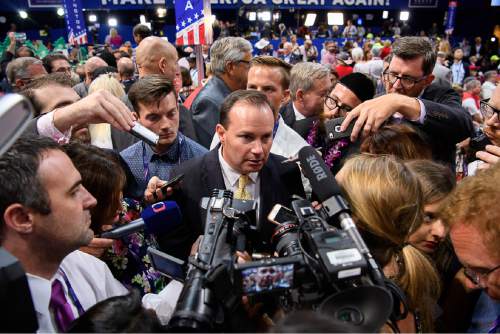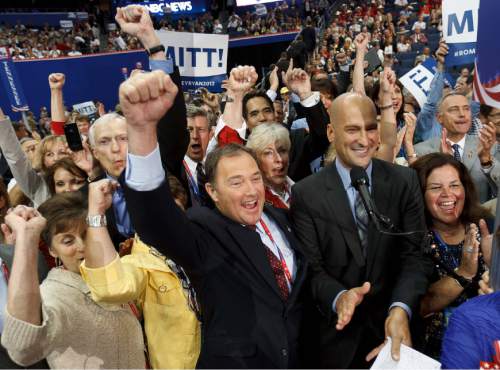This is an archived article that was published on sltrib.com in 2016, and information in the article may be outdated. It is provided only for personal research purposes and may not be reprinted.
One of their own — a Mormon and "Utah's favorite adopted son" — was about to take the crown as the Republican nominee for president. The Utah GOP delegates proudly offered their 40 votes for Mitt Romney but would have given more if they could.
That was then.
This is now. Utah's 40 votes were cast for Ted Cruz, a candidate long gone from the race, allowing party leaders to count them for Donald Trump. The state GOP chairman offered assurances that, of course, Utah would vote for the GOP presidential nominee come November. And forced smiles eventually turned to resignation in the group that has been dubbed by some the "never clap" delegation.
What a difference four years make.
Trump's brash style and controversial statements have some conservatives on edge and Utah's GOP delegates are hitting the exits before the nightly convention speeches end. Delegation breakfast meetings are aimed at persuading reluctant folks to at least tacitly support the nominee. And a field trip away from convention business is considered a highlight of the week.
"It's probably the extremes of going from the favorite son, representative — whether you liked it or not — of the [LDS] Church, who people got very excited about," says Boyd Matheson, president of the Sutherland Institute and an at-large delegate, "to now, where I think people are looking at the candidate and saying, 'is there some substance behind the rhetoric?' and harshness that rubs Utahns the wrong way."
Story continues after videos of Utah's votes in past two national conventions
2016 video courtesy of C-SPAN
2012 video courtesy of C-SPAN
The business mogul and reality TV celebrity placed a distant third in Utah's lopsided caucus victory for Cruz, and Trump raised the ire of Mormons when he questioned how devout Romney was in his LDS faith and talked about banning Muslims from entering the United States. Mormons, driven from state to state in the faith's infant years, took it personally.
So it is that Utah Republicans checked their enthusiasm at the door at this Republican National Convention.
"Politics ebbs and flows," says Enid Mickelsen, Utah's GOP national committeewoman. "Sometimes you're on the side that prevails and sometimes you're on the side that's unsuccessful and frankly, for a lot of states, the two don't usually go back to back."
Nominating Romney, who attended college and led the 2002 Winter Olympics in Utah, was a "lifetime thing," Mickelsen adds.
"It would be very, very unusual for someone to come literally out of Utah and be successful running for president and Mitt Romney was the closest thing we've ever had," she says. "That's an exciting thing for any group of people, to see one of us who could be president of the United States. It's also unrealistic to expect anything to match that in the next decade of Utah political life."
While Utah politicians flocked to the Tampa, Fla., convention four years ago, many are missing in action this time around. Some came, albeit reluctantly.
Rep. Mia Love, then a congressional candidate, had a prime speaking slot in 2012 and declined to attend this round, despite being elected as a delegate.
Utah Gov. Gary Herbert was a staunch Romney backer in 2012 and now says he'll vote for Trump, but with a pronounced lack of enthusiasm.
"I'm going to vote for Mike Pence, and Donald Trump comes along with the package," Herbert says, referring to Trump's running mate, the governor of Indiana.
Herbert says it's hard for Utah Republicans to go from seeing their adopted son as the party's standard bearer to Trump.
"So we go from that great high to now somebody who we don't think has the same kind of character and background, it is a bit of a let down," the governor says.
It doesn't help that Romney himself has been the leading Republican critic of Trump, calling him a "phony, a fraud" who is "playing the American public for suckers."
Thomas Wright, the former Utah GOP chairman who spoke for the delegates in 2012 to offer their 40 votes, said it's clear why there's a stark difference between the two conventions.
"In 2012, the Romney slate won and went to a Romney convention," he said. "In 2016, the Ted Cruz slate won and went to a Trump convention. You do the math."
That said, several Utah delegates say they're open and willing to come aboard the Trump train but that he's going to have to work for it.
"In 2012, I was excited to go out and vote. I knew how I was going to vote," said Jordan Hess, who was in Tampa then and part of the giddy Romney crowd, "and now Trump has four months to convince me that he's the one I should vote for."
tburr@sltrib.com





